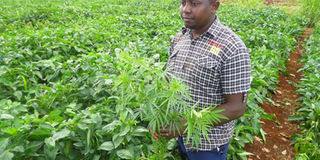Marigold is all I use to stop pests and diseases

Peter Mwange, the owner of the farm, uses the Mexican marigold plants to keep his capsicum healthy. The weeds, which keep pests that include aphids at bay, have seen him harvest up to two tonnes of hybrid capsicums after every 10 days. PHOTO | ALEX NYAGA
What you need to know:
- A fellow farmer advised him to plant Mexican marigold in the field where he was growing capsicum, in addition to practising crop rotation.
- Mwange normally collects seeds of the naturally growing Mexican marigold from the neighbourhood and broadcasts them on the farm he intends to grow the capsicums.
- Dr Nthakanio notes marigold as a bio-pesticide is preferred because it is easily bio-degradable and thus, has less effect on the environment compared to non-organic chemicals that pollute the environment. It is one of the safest ways to farm organically, he says.
The green capsicum plants are beautifully arranged on the half-acre farm in Mbeere, Embu County.
They have produced big fruits, a sign that they have been tended to well and are free of pests and diseases.
Jutting above the crops, about half-a-metre high, are another green plants. The crops, which are weeds, unlike the capsicum, have tiny shiny leaves.
Peter Mwange, the owner of the farm, uses the Mexican marigold plants to keep his capsicum healthy.
The weeds, which keep pests that include aphids at bay, have seen him harvest up to two tonnes of hybrid capsicums after every 10 days.
Mwange went into farming after trying a hand in cereals’ business and working in Nairobi as a mechanic soon after graduating from Machakos Technical College with a Diploma in Automotive Engineering in 2002.
To start farming on the family land in 2010, the 32-year-old sold a goat at Sh3,500, which he had bought when his business was doing well. He used the money to buy melon seeds that he planted, ending up with 1,800 plants that fetched him over Sh70,000 after about five months.
But he did not plant melons again as he had seen how capsicum was profitable and made the switch in early 2012.
He bought capsicum seeds, prepared seedbeds and after 45 days, he transplanted his seedlings to the main field. Initially, the capsicums were doing well, but things started to fall apart after he had transplanted them.
REPEL INSECTS
“An extension officer told me my capsicum had been infested by root-knot nematodes.”
The nematode larvae infects plant roots, leading to the development of root-knot galls that drain the plant’s nutrients. The parasites, which thrive in warm climate like that in Embu, normally kill young plants but for mature plants, they lead to decreased yields.
He lost over 3,000 plants to nematodes because he had to uproot them to save the rest.
A fellow farmer advised him to plant Mexican marigold in the field where he was growing capsicum, in addition to practising crop rotation. “Mexican marigold reduces nematode population and repels some pests common in capsicums and a range of vegetables,” says Mwange.
He started by first planting the marigold on the piece of land and later the capsicum.
“I ended up with only a few stunted and wilted crops. Aphids attack also declined,” he says.
Dr Paul Nthakanio, a geneticist, and bio-technology lecturer at Embu University College, and chairman of Agricultural Resource Management, says Marigold roots releases a chemical known as alpha-terthienyl, one of the naturally occurring toxics used in the making of nematicides and other pesticides, to curb nematodes and repel pests such as aphids.
Mwange normally collects seeds of the naturally growing Mexican marigold from the neighbourhood and broadcasts them on the farm he intends to grow the capsicums.
When the marigold grows; it produces a smell that suppresses nematodes. “To effectively manage nematodes, I plant marigold at least two to three months before growing capsicums,” he says, adding that marigold’s smell wards off aphids.
The use of marigold has seen him save at least 30 per cent of his production costs.
Dr Nthakanio notes marigold as a bio-pesticide is preferred because it is easily bio-degradable and thus, has less effect on the environment compared to non-organic chemicals that pollute the environment. It is one of the safest ways to farm organically, he says.
Currently, Mwange grows a hybrid capsicum called Commandant F1, which is resistant to diseases and pests, and matures faster. “I start to harvest fruits from this variety after 70 days as opposed to 90 days with the others after transplanting.”
The move has seen him increase production from 1,400 to 2,000kg after 10 days.
HYBRID VARIETY
The red and green peppers are the same fruit of the capsicum plant; only that the green one is picked earlier. When the green matures, it turns red, explains Dr Nthakanio. Mwange sells the peppers to buyers from Nairobi for Sh40 per kilo when green. He has currently employed two people, paying them Sh350 per day and has built himself a decent house, money that has come from his venture.
Dr Nthakanio says after maturity, the level of ethylene, a hormone responsible for ripening in capsicum, increases and this makes green fruits to turn red.
Towards the end of production lifespan of his capsicums at four to five months, Mwange leaves few fruits to turn red to allow him earn more as a kilo of red pepper goes for Sh80.
Dr Nthakanio says the hybrid variety is better than the non-hybrid one because it arises from the cross-breeding of genetically different organism.
He says since they mature faster, the hybrid plants are less susceptible to pests and diseases.
“Although a kilo of red capsicums fetches almost twice the price of the green one, I prefer to harvest them green after 10 days than wait until after 20 days in the case of red.”




